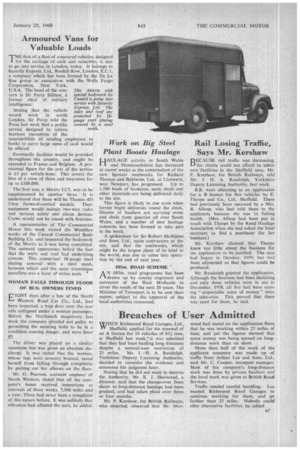Armoured Vans for Valuable Loads
Page 41

If you've noticed an error in this article please click here to report it so we can fix it.
THE first of a fleet of armoured vehicles, designed for the carriage of cash and valuables, is due to go into service in Landon, today. It belongs to Security Express, Ltd., Bunhill Row, London, E.C.1, a company which has been formed by the De La Rue group in association with the Wells Fargo Corporation, New York, U.S.A. The head of the con7 cern is Sir Percy Sillitoe, a former chief of military intelligence. Stating that the vehicle would work in north London, Sir Percy told the Press last week that a public service designed to relieve business executives of the responsibility of sending employees to banks to carry large sums of cash would be offered. This Morris with special bodywork by Cunard is going into service with Security Express, Ltd. The sides and roof are protected by 18gauge steel plating covered by a steel
mesh.
Eventually facilities would be provided throughout the country, and might be extended to France and Belgium. A provisional figure for the cost of the service is £3 per vehicle-hour. This covers the hire of a crew of three and insurance for up to £100.000, The first van. a Morris LC5, was to be supplemented by another three. It is understood that these will be Thames 4D 2-ton forward-control models. Their equipment would include two-way radio and various safety and alarm devices. Crews would not be issued with firearms. A representative of The Commercial Motor this week visited the Wembley works of the Cunard Commercial Body Building Co. and inspected the bodywork of the Morris as it was being completed. The outward appearance belied the fact that the walls and roof had underlying armour. This comprised 18-gauge steel plating covered with a steel mesh. between which and the outer aluminium panelling was a layer of nylon pads.
WOMAN FALLS THROUGH FLOOR OF BUS: OWNERS FINED
EIGHT days after a bus of the North Western Road Car Co., Ltd., had been inspected, a trap door over the !Tar axle collapsed under a woman passenger. Before the Northwich magistrate last week the company pleaded not guilty to permitting the securing bolts to be in a condition causing danger, and were fined £5.
The driver was placed on a similar summons but was given an absolute discharge. It was stated that the woman, whose legs were severely bruised, saved herself from falling through completely by putting out her elbows on the floor. Mr. G. Pearson, assistant engineer of North Western, stated that all the company's buses received inspections at intervals of three weeks, 7,500 miles and a year. There had never been a complaint of this nature before. It was unlikely that vibration had affected the nuts, he added.
Work on Big Steel Plant Boosts Haulage
HAULAGE activity in South Wales and Monmouthshire has increased in recent weeks as the construction of the new Spencer steelworks for Richard Thomas and Baldwins, Ltd., at Llanwern, near Newport. has progressed. Up to 1,500 loads of hardcore, sand, shale and other materials are being delivered daily to the site. This figure is likely to rise soon when lorries begin deliveries round the clock. Dozens of hauliers are carrying stone and shale from quarries all over South Wales, and a number of new haulage concerns has been formed to take part in the work. A spokesman for Sir Robert McAlpine and Sons, Ltd.. main contractors at the site, said that the steelworks, which might be the largest plant of its kind in the world, was due to come into operation by the end of next year.
045m. ROAD SCHEME
AN £85m. road programme has been drawn up by county engineers and surveyors of the West Midlands to cover the needs of the next 20 years. The Minister of Transport is to be sent their report, subject to the approval of the local authorities concerned.
Rail Losing Traffic, Says Mr. Kershaw
BECAUSE rail traffic was decreasing, his clients could not afford to admit new facilities in the Sheffield area, Mr. P. Kershaw, for British Railways, told Mr. J. H. A. Randolph, Yorkshire Deputy Licensing Authority, last week. B.R. were objecting to an application for a B licence for five vehicles by E. Thorpe and Co., Ltd., Sheffield. These had previously been operated by a Mrs. R. Allsop, who had sold them to the applicants because she was• in failing health. (Mrs. Allsop had been put in touch with Thorpe by the Road Haulage Association when she had asked the local secretary to find a purchaser for her business.) Mr. Kershaw claimed that Thorpe knew too little about the business for the application to be justified. The case had begun in October, 1959. but had been adjourned so that figures could be produced. Mr. Randolph granted the application. Although the business had been declining and only three vehicles were in use in December, 1958, all five had been earning " respectable sums of money since the take-over. This proved that there was need for them, he said.






































































































